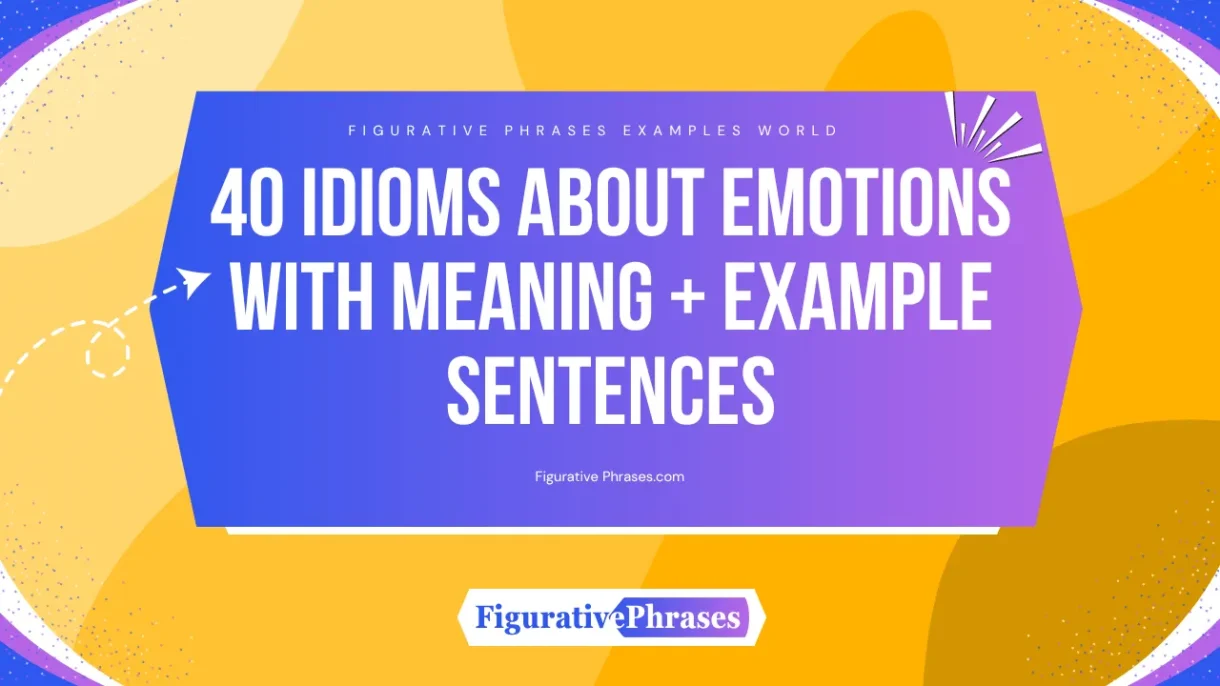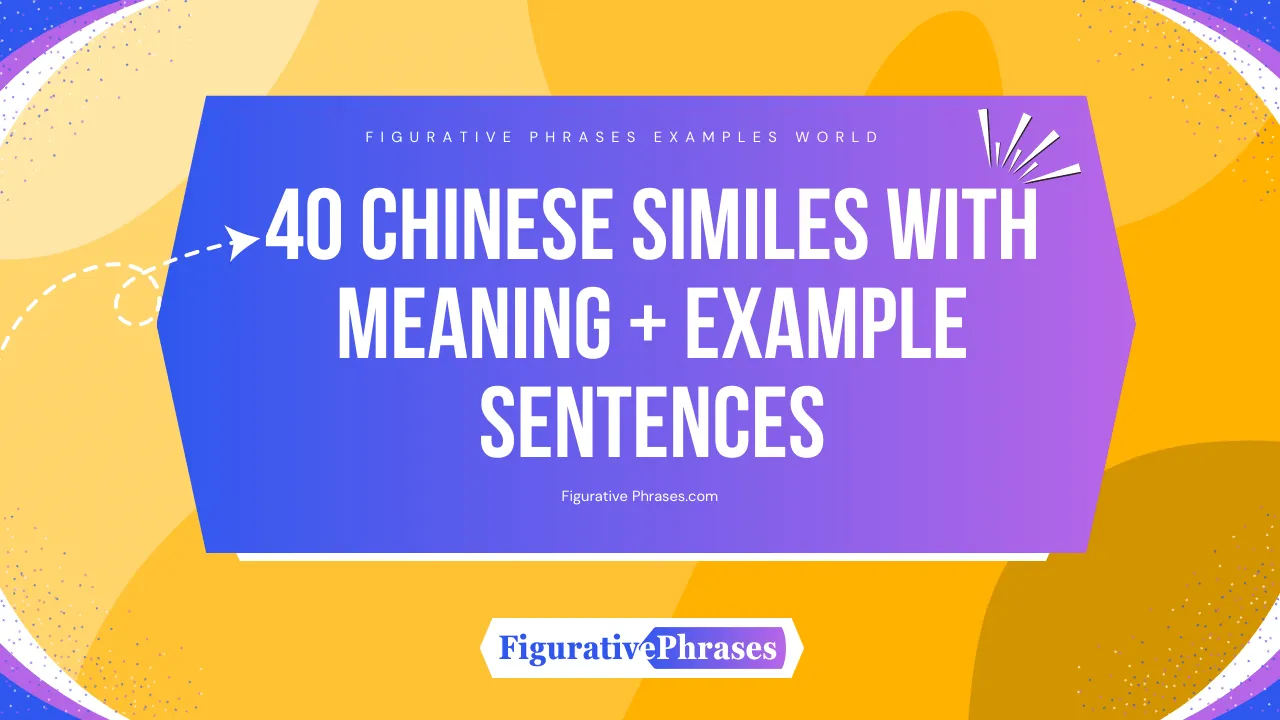
I made 40 phrases about emotions to share clear, everyday idioms for emotions—happy, sad, love, hate, anger, calm, excited, bored, and even mixed feelings. I explain what each idiom means, when to use it, give a short example, and offer simple swap-in words. First i write expressions about emotions.
What are the idioms about emotions with examples?
I’m giving the most useful emotion idioms in clear, simple terms. Each one includes meaning, when to use it, a short example, and quick synonyms you can swap in.
Wear your heart on your sleeve
- Meaning: Show feelings openly.
- When to use: Someone is very transparent about emotions.
- Example: “She wears her heart on her sleeve, so you always know when she’s happy or hurt.”
- Other ways to say: open-hearted, transparent, expressive, unguarded, candid
Bottle it up
- Meaning: Keep feelings inside.
- When to use: Someone hides emotions to avoid conflict or pain.
- Example: “Don’t bottle it up—talk about what’s bothering you.”
- Other ways to say: repress, hold in, swallow feelings, stifle, clamp down
Hit a nerve
- Meaning: Touch a sensitive feeling.
- When to use: A remark triggers a strong emotional reaction.
- Example: “The comment about deadlines hit a nerve with the team.”
- Other ways to say: touch a sore spot, strike a chord, push a button, trigger, set off
In high/low spirits
- Meaning: Feel cheerful or down.
- When to use: Quick read on someone’s mood.
- Example: “After the news, he was in low spirits all day.”
- Other ways to say: upbeat/downcast, cheerful/gloomy, buoyant/blue, lively/flat, perky/dull
Over the moon
- Meaning: Extremely happy.
- When to use: Big wins or good news.
- Example: “She was over the moon after the job offer.”
- Other ways to say: thrilled, elated, delighted, joyous, ecstatic
A big lift in mood sets us up for happiness next.
What are the idioms about Happiness With Examples?
These idioms show bright, bubbly joy. Use happy idioms for wins, surprises, and feel-good moments.
On cloud nine
- Meaning: Deep joy.
- When to use: After a dream result.
- Example: “He was on cloud nine when his article went viral.”
- Other ways to say: euphoric, blissful, beaming, overjoyed, radiant
In seventh heaven
- Meaning: Perfect happiness.
- When to use: Peak moments.
- Example: “They were in seventh heaven on their wedding day.”
- Other ways to say: bliss, rapture, ecstasy, delight, joy
Walking on air
- Meaning: Light, floaty joy.
- When to use: When news makes you feel weightless.
- Example: “She’s been walking on air since the acceptance email.”
- Other ways to say: buoyant, uplifted, lighthearted, merry, sunny

Tickled pink
- Meaning: Very pleased.
- When to use: Cute compliments or small wins.
- Example: “Grandma was tickled pink by the surprise call.”
- Other ways to say: pleased, chuffed, glad, gratified, delighted
A silver lining
- Meaning: Good in a bad situation.
- When to use: Hope during tough times.
- Example: “Losing the job had a silver lining—he started his own business.”
- Other ways to say: upside, bright side, hopeful sign, redeeming feature, glimmer
Even joy has shadows, which leads into sadness.
What are the idioms about Sadness With Examples?
These sad idioms mark low mood, loss, and letdowns.
Down in the dumps
- Meaning: Very sad.
- When to use: Slumps after bad news.
- Example: “He’s down in the dumps after the breakup.”
- Other ways to say: dejected, low, gloomy, depressed, bleak
Feel blue
- Meaning: Mild sadness.
- When to use: Quiet, rainy-day moods.
- Example: “I feel blue when the house is empty.”
- Other ways to say: sad, melancholic, somber, glum, moody
Cry over spilled milk
- Meaning: Lament what can’t be changed.
- When to use: Urge to move on.
- Example: “It’s done—no use crying over spilled milk.”
- Other ways to say: let go, move on, water under the bridge, bygones, past is past
Heart sinks
- Meaning: Sudden drop in hope.
- When to use: Bad outcomes emerge.
- Example: “Her heart sank when her name wasn’t called.”
- Other ways to say: disheartened, crushed, crestfallen, deflated, dashed
Heartache
- Meaning: Deep, painful sorrow (often romantic).
- When to use: Love-related grief.
- Example: “The song captured the heartache of distance.”
- Other ways to say: sorrow, anguish, heartbreak, woe, pain
Sadness often springs from or circles back to love.
What are the idioms about Love With Examples?
Use these idioms for affection, romance, and warm bonds.
Head over heels
- Meaning: Madly in love.
- When to use: Sudden, strong attraction.
- Example: “He’s head over heels for her.”
- Other ways to say: smitten, besotted, infatuated, enamored, captivated
Love at first sight
- Meaning: Instant love.
- When to use: First meeting sparks.
- Example: “They say it was love at first sight at the café.”
- Other ways to say: instant spark, immediate chemistry, instant click, sudden crush, instant bond
Swept off one’s feet
- Meaning: Overwhelmed by charm.
- When to use: Dazzling first dates.
- Example: “She was swept off her feet by his kindness.”
- Other ways to say: dazzled, charmed, won over, enchanted, wooed
Apple of one’s eye
- Meaning: Cherished person.
- When to use: Special affection.
- Example: “Their baby is the apple of their eye.”
- Other ways to say: favorite, treasure, darling, beloved, dearest
Love-hate relationship
- Meaning: Swinging between affection and dislike.
- When to use: Hot-cold bonds.
- Example: “It’s a love-hate relationship with fame.”
- Other ways to say: mixed feelings, push-pull, ambivalent, on-off, conflicted
Where love frays, hate can show.
What are the idioms about Hate With Examples?
These idioms capture dislike, aversion, and strong negative feeling.
Can’t stand
- Meaning: Strong dislike.
- When to use: Clear aversion.
- Example: “I can’t stand rude service.”
- Other ways to say: loathe, detest, abhor, dislike, resent
Rub someone the wrong way
- Meaning: Annoy someone unknowingly.
- When to use: Clashing personalities.
- Example: “His jokes rub her the wrong way.”
- Other ways to say: irritate, nettle, grate, vex, irk
Get under one’s skin
- Meaning: Keep on irritating.
- When to use: Ongoing annoyance.
- Example: “The noise gets under my skin.”
- Other ways to say: needle, provoke, bother, nag, pester
Have it in for someone
- Meaning: Harbor ill will.
- When to use: Targeted dislike.
- Example: “She thinks the coach has it in for her.”
- Other ways to say: spite, hostility, grudge, animus, vendetta
Make one’s blood boil
- Meaning: Cause intense anger.
- When to use: Injustice or insult.
- Example: “The scam made my blood boil.”
- Other ways to say: enrage, infuriate, incense, rile, inflame
Rising hate often bursts as anger.
What are the idioms about Anger With Examples?
The idioms about Anger With Examples are see red.
See red
- Meaning: Feel sudden rage.
- When to use: Instant anger.
- Example: “He saw red at the unfair call.”
- Other ways to say: furious, livid, incensed, irate, wrathful
Blow a fuse
- Meaning: Lose temper quickly.
- When to use: Short trigger moments.
- Example: “She blew a fuse when the file vanished.”
- Other ways to say: snap, explode, erupt, go off, lose it
Fly off the handle
- Meaning: Burst into anger without warning.
- When to use: Zero-to-sixty rage.
- Example: “Don’t fly off the handle—let’s check first.”
- Other ways to say: flare up, lash out, blow up, go ballistic, boil over
Hot under the collar
- Meaning: Annoyed and flushed.
- When to use: Embarrassed anger.
- Example: “He gets hot under the collar at criticism.”
- Other ways to say: peeved, miffed, sore, testy, cross
Keep your cool
- Meaning: Stay calm under stress.
- When to use: De-escalation.
- Example: “She kept her cool and solved it.”
- Other ways to say: stay composed, keep calm, steady nerves, self-control, poise
Holding steady takes us to calm.
What are the idioms about Calm With Examples?
The Idioms about calm with examples are cool as cucumber. These idioms point to steady nerves, control, and quiet.
Cool as a cucumber
- Meaning: Very calm.
- When to use: Pressure moments.
- Example: “He stayed cool as a cucumber during the audit.”
- Other ways to say: composed, serene, unflappable, collected, tranquil
Take it in stride
- Meaning: Handle trouble smoothly.
- When to use: Bumps don’t rattle you.
- Example: “She takes setbacks in stride.”
- Other ways to say: accept, absorb, roll with it, handle, adapt
Keep a stiff upper lip
- Meaning: Show no emotion.
- When to use: Formal restraint.
- Example: “He kept a stiff upper lip through the trial.”
- Other ways to say: stoic, reserved, buttoned-up, restrained, impassive
Breathe easy
- Meaning: Relax after tension.
- When to use: Problem passes.
- Example: “We can breathe easy now the report’s done.”
- Other ways to say: relax, unwind, decompress, exhale, settle
The calm before the storm
- Meaning: Quiet right before action.
- When to use: Expect a surge.
- Example: “The office hush felt like the calm before the storm.”
- Other ways to say: lull, pause, quiet spell, stillness, hush
After stillness, excitement often spikes.
What are the idioms about Excited With Examples?
These idioms show buzz, thrill, and eager energy.
Pumped up
- Meaning: Very eager.
- When to use: Before events.
- Example: “The team’s pumped up for launch.”
- Other ways to say: amped, fired up, keyed up, hyped, charged
Buzzing with energy
- Meaning: Full of lively excitement.
- When to use: Electric atmospheres.
- Example: “The hall was buzzing with energy.”
- Other ways to say: lively, vibrant, animated, peppy, spirited
Chomping at the bit
- Meaning: Impatient to start.
- When to use: Delays before action.
- Example: “They’re chomping at the bit to present.”
- Other ways to say: itching to go, raring, eager, antsy, impatient
On the edge of one’s seat
- Meaning: Gripped with suspense.
- When to use: Thrilling moments.
- Example: “The finale kept us on the edge of our seats.”
- Other ways to say: riveted, enthralled, absorbed, hooked, spellbound
A flash in the pan
- Meaning: Brief burst that fades.
- When to use: Hype that doesn’t last.
- Example: “The trend was a flash in the pan.”
- Other ways to say: short-lived, fleeting, momentary, passing thrill, fad
When the thrill fades, boredom creeps in.
What are the idioms about Boredom With Examples?
These idioms cover dullness, sameness, and idle time.
Bored to tears
- Meaning: Extremely bored.
- When to use: Tedious tasks.
- Example: “I was bored to tears in that meeting.”
- Other ways to say: bored stiff, bored rigid, dead bored, mind-numbed, uninterested
Twiddle your thumbs
- Meaning: Do nothing while waiting.
- When to use: Delays with no task.
- Example: “We twiddled our thumbs for an hour.”
- Other ways to say: idle, wait around, mark time, kill time, loaf
Watch paint dry
- Meaning: Describe extreme dullness.
- When to use: Mock a boring activity.
- Example: “This tutorial is like watching paint dry.”
- Other ways to say: tedious, dull, monotonous, humdrum, dreary
Same old, same old
- Meaning: No change; routine.
- When to use: Repeating patterns.
- Example: “Work’s the same old, same old.”
- Other ways to say: routine, repetitive, predictable, stale, unvaried

Itching for a change
- Meaning: Eager to break boredom.
- When to use: Ready to refresh.
- Example: “After months indoors, I’m itching for a change.”
- Other ways to say: craving variety, seeking novelty, ready to shake up, need a switch, hungry for new
Craving variety opens space for other emotions.
What are other idiom about emotions With Examples?
Here are extra emotion idioms beyond the main groups.
Green with envy
- Meaning: Very jealous.
- When to use: Someone covets another’s success.
- Example: “They were green with envy at her award.”
- Other ways to say: jealous, envious, covetous, resentful, sore
Pride and joy
- Meaning: Source of great pride.
- When to use: Cherished achievements or people.
- Example: “The vintage car is his pride and joy.”
- Other ways to say: treasure, crowning glory, chief delight, favorite, jewel
Eaten up with guilt
- Meaning: Consumed by remorse.
- When to use: After wrongdoing.
- Example: “He was eaten up with guilt after the lie.”
- Other ways to say: remorse, contrition, shame, regret, penitence
Hang one’s head in shame
- Meaning: Show public remorse.
- When to use: Admit fault.
- Example: “She hung her head in shame and apologized.”
- Other ways to say: abashed, ashamed, mortified, humbled, chastened
Bittersweet
- Meaning: Mixed happy-sad feeling.
- When to use: Joy with a tinge of loss.
- Example: “Graduation day felt bittersweet.”
- Other ways to say: sweet-sad, poignant, mixed joy, tender-sad, aching joy
Bittersweet moments often become mixed emotions.
What are The idiom about Mixed emotions With Examples?
These idioms capture conflicting feelings at the same time.
Have mixed feelings
- Meaning: Unsure because feelings clash.
- When to use: Pros and cons both strong.
- Example: “I have mixed feelings about moving.”
- Other ways to say: ambivalent, torn, divided, conflicted, unsure
Torn between two
- Meaning: Pulled in opposite directions.
- When to use: Two appealing or tough options.
- Example: “She’s torn between duty and desire.”
- Other ways to say: split, pulled, conflicted, wavering, undecided
On the fence
- Meaning: Not choosing a side yet.
- When to use: Need more time or info.
- Example: “He’s on the fence about the offer.”
- Other ways to say: undecided, hesitant, wavering, noncommittal, unsure
A double-edged sword
- Meaning: Brings both good and bad.
- When to use: Trade-offs.
- Example: “Fame is a double-edged sword.”
- Other ways to say: mixed blessing, trade-off, pros and cons, two-sided, cost-benefit
Ride the ups and downs
- Meaning: Accept changing feelings.
- When to use: Life swings between highs and lows.
- Example: “In startups, you ride the ups and downs.”
- Other ways to say: ebb and flow, peaks and valleys, swings, flux, back-and-forth
Mixed states bring us back to the full range of emotions.
Other idiom examples.






0 Comments